





What do you love about the Sabbath? Is it the chance to get out in nature? Perhaps it’s being able to switch off from the stress of work or study? To rest and re-energise. We know it’s good for our mental health and builds relationships. The Sabbath is truly a gift that transforms lives.

So what does the Sabbath mean to you? Create a short video or social media post and share the gift of the Sabbath. We’re aiming to reach 10 million people this June. It’s easy to get involved and there are prizes to be won!

I’ve probably told you this before but as a young boy I used to love reading missionary stories on a Sabbath afternoon. I’d curl up on the couch or on my bed and immerse myself in the adventure and danger faced by those whose convictions called them to leave everything that was comfortable to share the good news of Jesus.
The stories were one ingredient in my fledgling faith that caused me to commit to God by saying, “Whatever You want me to do with my life, I’ll do it.” In my private prayers I would often follow the statement with “Just lead me/show me, what that is.”
For a kid who had absolutely no idea what to do with my life, I was trusting that God would map out my path, help me to find something I could do; not just to keep me busy but for His purpose.
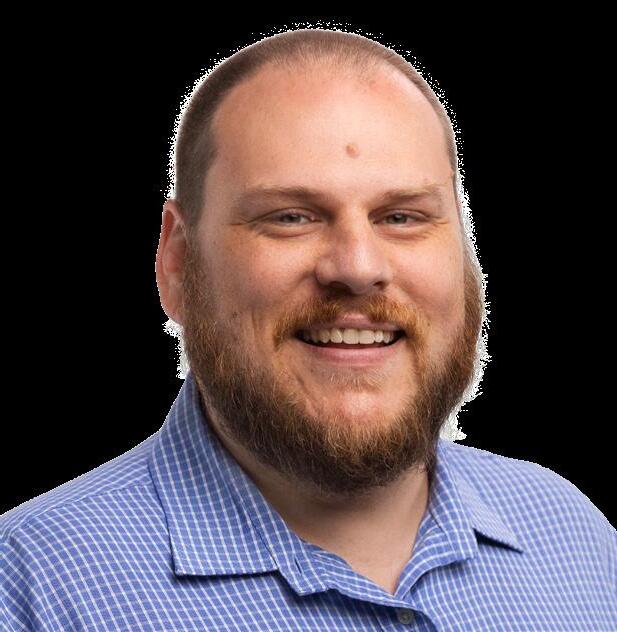
As the end of high school neared, I became more anxious for the future. I clung to the promise of God that He would show me a way forward in my life. And He did.

Looking back, I truly believe God led me through the big decisions with compassion and care. I gained the entry mark for my second university preference but not quite my first. I received a scholarship to study at Avondale. I then received credit for my first year at state university, so I only had two years left for my degree.
Since then, God has kept leading me through highs and lows, both personal and career. Just because I’ve been on a path I’ve felt is following His purpose in my life doesn’t mean I haven’t experienced seasons of doubt and difficulty along the way.
There have been days when I’ve questioned my calling, wanted to give up or change course. Not just days but whole months or seasons. But He’s always guided me through. And even at times when He’s seemed largely silent, I’ve found the strength to continue by trusting His leading in the past. In those times, I’ve clung to what He’s done, remembering that I wouldn’t be where I am without Him.
Eventually, when the season passes and things change, I can see His hand in hindsight.
I’m still amazed that I get to work on Adventist Record to serve the Church and tell the stories of what God is doing around the South Pacific. My 16 years here is a small part of the 125 years of history and the legacy of this faithful publication. Looking back I can see God’s hand at work through the Church and the Record over the 125 years. As I’ve been reading back through old issues, seeing global challenges like the Spanish flu, world wars, heartache and hardship for our missionaries and more, I’ve been struck by the spirit of optimism and encouragement; the sense that these people, these voices from the past, were convicted that they were led by God and following His calling. That they remembered the things He had done in the past even in the worst of times and were hopeful for a brighter future.
Change is inevitable. It happens to all of us. But through 125 years, Record has remained right next to you. There have been changes over time. Some have been necessary, some have been exciting, some have been painful. And that’s just in my time at Record. We’ve adjusted our name, changed locations, added new platforms and updated our bios, but we’re still committed to telling your stories of what God is doing in the South Pacific Division. Mission is in our DNA and we can’t stop telling the stories.
This Sabbath is the Record offering (I’ll resist the urge to make a pun). As we celebrate this milestone, we’re so thankful for God and His leading. God’s hand has been clear in my life and the life of this magazine.
But we’re also thankful for you. The church. Those who fill our pages with colour, life and love. Consider supporting us in keeping this amazing legacy going.
And keep reading, keep writing, keep thinking and keep believing.
There have been days when I’ve questioned my calling, wanted to give up or change course. Not just days but whole months or seasons.
The prevalence of chronic disease (defined as a condition that lasts longer than one year) in the South Pacific is astounding. In Australia alone, one in 20 people have diabetes, one in 20 have a heart or vascular condition, and one in five have mental health conditions.
Overall, nearly half the population have at least one chronic condition.

In other countries in the Division there are even higher rates of preventable disease. How positive then to see, presented at the recent ELIA Wellness Summit, the stories of radical life transformation because of the CHIP program. The stories shared were local and are ones that are repeated right around the world where the CHIP program is used in local community and church settings.
Recently I heard a story from the UK where an individual crippled with rheumatoid arthritis has returned to swimming. This adds to many other stories, including diabetes remission, improved blood pressure and cholesterol, improved mental health, improvement in IBS and the list goes on . . . stories of life transformation with comments like “Now I have hope” and “Thank you for giving me my life back”.
I can’t help but be both humbled and amazed by the power of these stories and the way that local churches and lifestyle medicine practitioners are radically impacting and improving public health. What an amazing asset the CHIP health intervention program is—a program which is now supported by more than 46 peer-reviewed scientific papers and clinical research studies.
Dr Michael Greger, a global leading lifestyle medicine practitioner in the US, said “the best approach I have seen is CHIP”.
The American College of Lifestyle Medicine said “[CHIP] . . . yielded some of the most impressive clinical changes ever in the literature”. Local churches being community centres of influence driving real life and health transformational experiences and outcomes? To me that sounds like real mission delivery!





“I have come that you may have life and life abundantly” (John 10:10). Our mission remains to share the good news, to transform lives, to bring hope. Programs like CHIP can be front and centre of supporting life transformation experiences. How is your church being a centre of influence in its community?
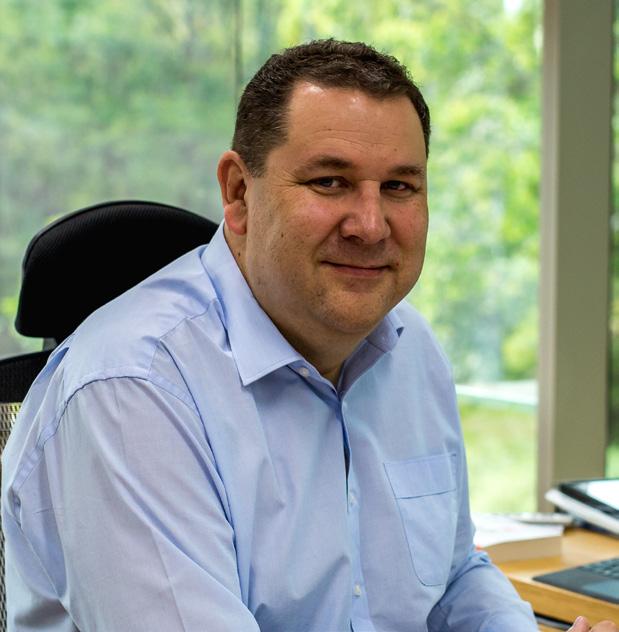
INSIGHT:
“Thank you for giving me my life back”
Kevin Jackson CEO, Sanitarium Health and Wellbeing Group
Fiji ranks number four in percentage for online searches for the word “porn” and ninth for the word “pornography”, according to a training session held by Pastor Letitia Shelton at the Tamavua Methodist Church on March 22.
The session, held for Fijian pastors and church leaders of another denomination, was attended by the Adventist Church in Fiji’s ministerial director, Pastor Tiko Kabu and his colleague Children, Women and Family Ministries director Alice Kaisuva.
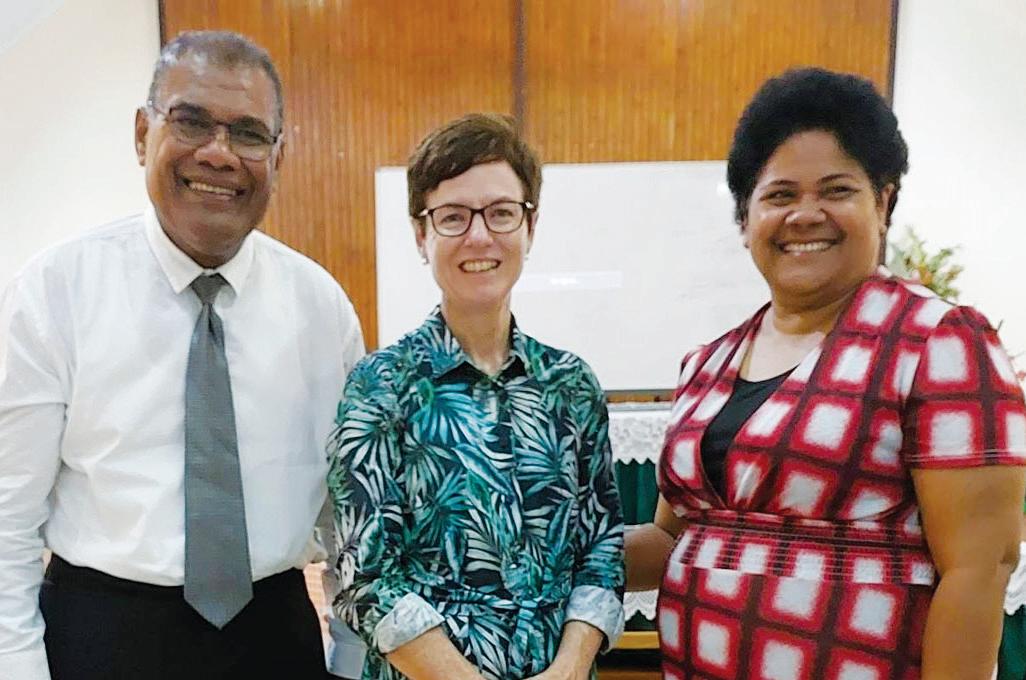
Pastor Shelton from Toowoomba, Queensland, addressed the issue of domestic violence and pornography in Fiji to an audience of pastors from numerous denominations. Pastor Shelton, a long-time advocate against pornography, founded the “City Free From Porn” campaign in Toowoomba.
According to Pastor Kabu, the presentation was timely and important as the impact of pornography upon the church, schools, families and the community is very real within the Pacific. “The text in Isaiah 61:1 sounds very much like a call to action for our entire church in Fiji.
“We are to proclaim the good news to the poor . . . bind up the brokenhearted, proclaim freedom for the captives to addictions and pornography, this is exactly what the church needs to be doing,” said Pastor Kabu. “Because we hold positions of leadership for the Church in Fiji, we need to be actively addressing these issues from our pulpits, church board rooms and among our faith community. It is a difficult conversation to have, however it is a much needed one. This is our responsibility.”
An apology video has also been produced by Pastor Shelton featuring five Fijian pastors, however, Pastor Shelton reminded her audience that “apologising without change is manipulation”.
Pastor Shelton shared that while it is good to acknowledge that we have not always got it right, we do need to change the way we deal with these sensitive issues.
Pastor Kabu and Mrs Kaisuva feel a renewed sense of purpose and calling upon their arenas of leadership after attending this workshop.
You can view the apology video on: <bit.ly/41ibeDl>.
Wahroonga, NSW | Brenton Stacey/Record staff
Avondale University’s Bachelor of Nursing has been ranked number one in Australia for overall satisfaction, according to a Quality Indicators for Learning and Teaching survey.
Over 93 per cent of graduates agreed or strongly agreed with the quality of the course, compared to a national average of 75 per cent.
Natalie Turley, who graduated in 2021, attributed the course’s success to the “opportunities” provided by lecturers, particularly when she was struggling with chemistry.
Ms Turley, who now works in radiation oncology at Westmead Hospital, also praised the course’s wholistic focus,
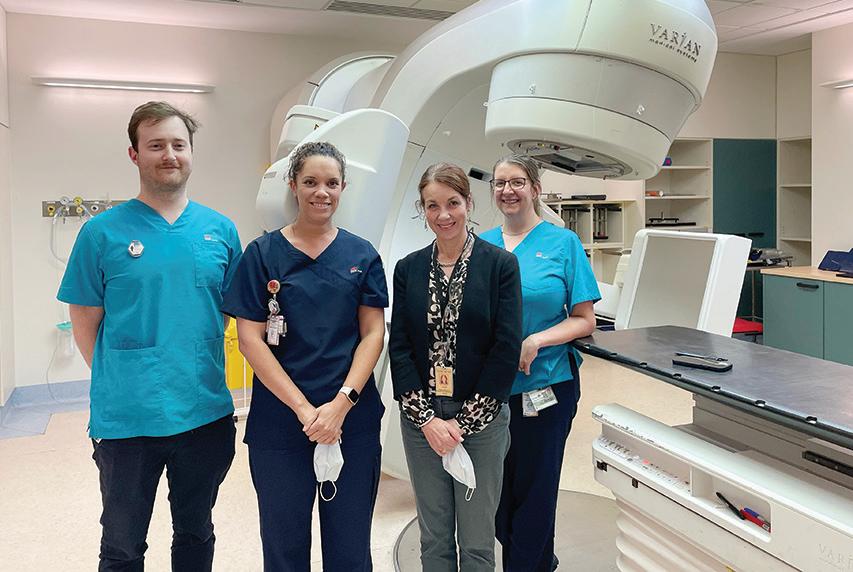
which prepared her for the challenging environment of patient care.
“The cancer journey is a tough one for patients and families. As a nurse, I have the privilege of supporting them along the way. The wholistic focus of my degree prepared me for being part of this private space. You don’t have to have the right words to say. You just have to be present and available. That’s what’s been modelled to us.”
Head of the School of Nursing and Health, Tamera Gosling, thanked her staff for their commitment to a quality learning experience, saying “they live out our Avondale values, which reflects their own faith and spirituality”.
Gympie Seventh-day Adventist Church in Queensland celebrated a belated 100th year anniversary recently.
Gympie company was first organised into a church in 1922 with 26 members. Major flooding and restrictions in 2022 made the 100-year celebrations impossible, so the event was postponed to March 25, 2023.
South Queensland Conference president Pastor Brett Townend and his family joined in the anniversary occasion and reflected on their historic family roots in the district. Pastor Townend’s mother and grandparents became Adventists in Gympie. His mum Dawn attended. Also in attendance was Jessie Cole (baptised in 1951), the longest surviving member of Gympie.
Other highlights included the ordination of some of the young (and young at heart) deacons; the collection of a
special offering for planned renovations and extensions to the current church hall; and a shared lunch that included homemade, beautifully decorated celebratory cupcakes.
The Gympie church hall was originally constructed in 1957 at the Gympie church site in Crown Road. The timber for the hall floor and walls was provided by Dave and Jessie Cole from their farm in Amamoor. The hall was moved in 1961 to its present location.
The current church was originally built in 1970 and the first service in it was conducted by Pastor Roger Vince in March 1970.
“A special thanks to all who helped organise and those who attended this milestone event!” said a church representative. “[We are] Praising God for His leading in the past 100 years and in the future of Gympie church.”
Pacific health leaders have completed a “Journey to Wholeness” program, organised by the Trans Pacific Union Mission (TPUM) and South Pacific Division (SPD). The health training program was held at the Coral Coast Christian Camp in Deuba, Fiji, from March 14 to 22.
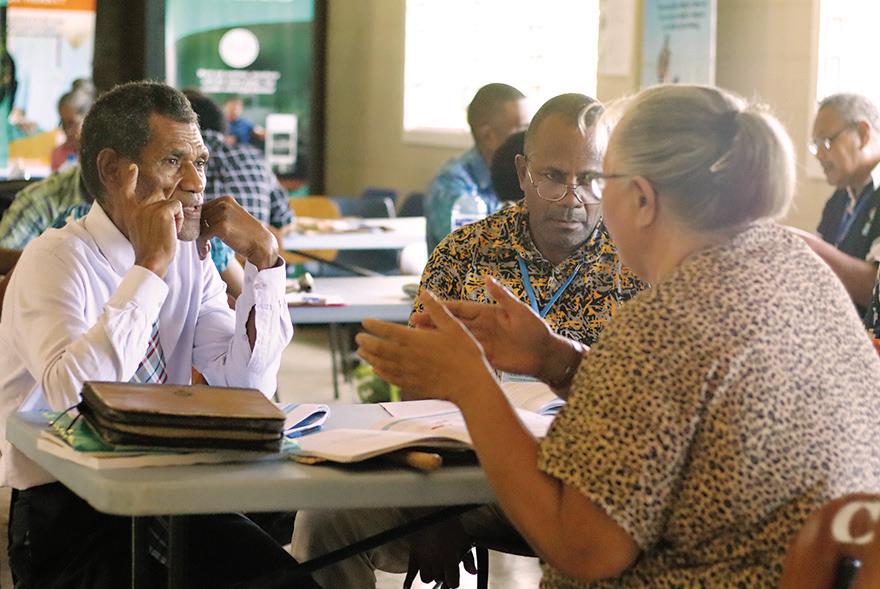
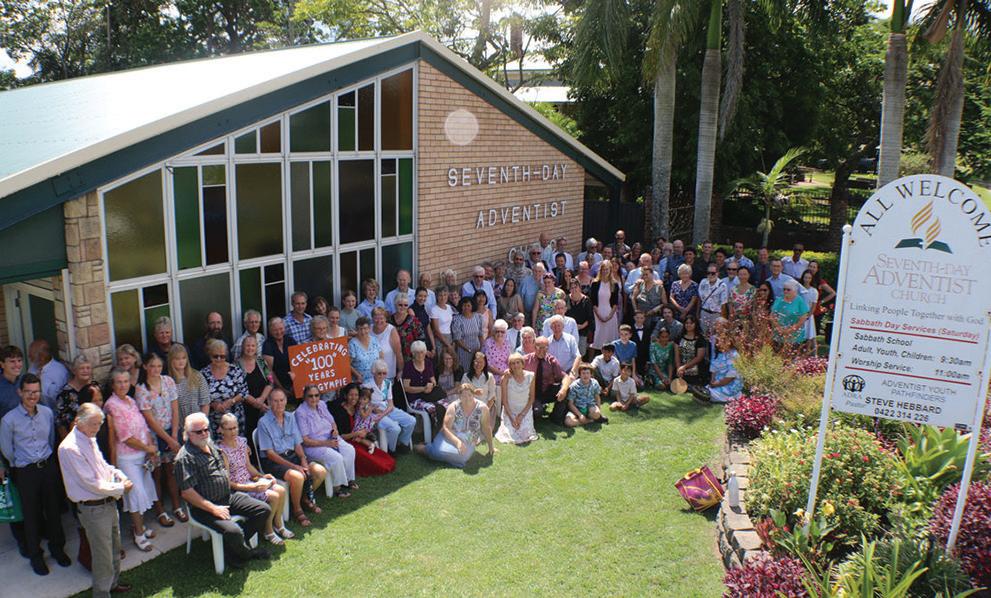
Sponsored by the 10,000 Toes campaign, the program aimed to equip health leaders across the TPUM with the skills to become effective lifestyle coaches and addiction recovery specialists.
The program included two workshops: the Addiction Recovery Program and the Lifestyle Coaching Skills program, facilitated by Dr Katia Reinert, General Conference Health Ministries associate director and Adventist Recovery Ministries global coordinator. The Addiction Recovery Program focused on addiction and interventions, as well as the spiritual concepts of recovery and healing. The Lifestyle Coaching Skills program emphasised the importance of lifestyle coaching and how to approach it effectively.
In total, 40 participants from around the
TPUM, including Tonga, Samoa, Tuvalu, American Samoa, Vanuatu, Solomon Islands, Kiribati, Nauru and Fiji, received certificates at the end of each workshop.
Dr Flora Lutui from Tonga learned that “addictions are not only the really bad things that we normally talk about, like drugs and alcohol, but even small things like divulging in sugary foods, long hours on social media and sports can all be an addiction which we need to be careful of”.
TPUM health coordinator and 10,000 Toes ambassador director, George Kwong, described the program as very successful, adding that “our health leaders from around the Pacific region have been informed, inspired and equipped to take this knowledge and skills back to their countries and missions”.
Dr Reinert highlighted the importance of being connected to Jesus while extending the healing ministry to others. “We are Jesus’ hands and feet. In order to extend the healing ministry to others, we ourselves need to be connected to Him who is the source of true and lasting healing.”
Pacific health leaders complete “Journey to Wholeness”
Deuba, Fiji | John Tausere
An Adventist minister has become the fastest triathlon pastor in Europe. Marc Naumann not only achieved his goal of being the fastest pastor in Europe in his age group, but also qualified for the world championships for the sprint distance. As a sports ambassador for Hope TV, he wants to spread hope without ceasing and inspire people to lead a fulfilled life through the hope only God can offer.—APD

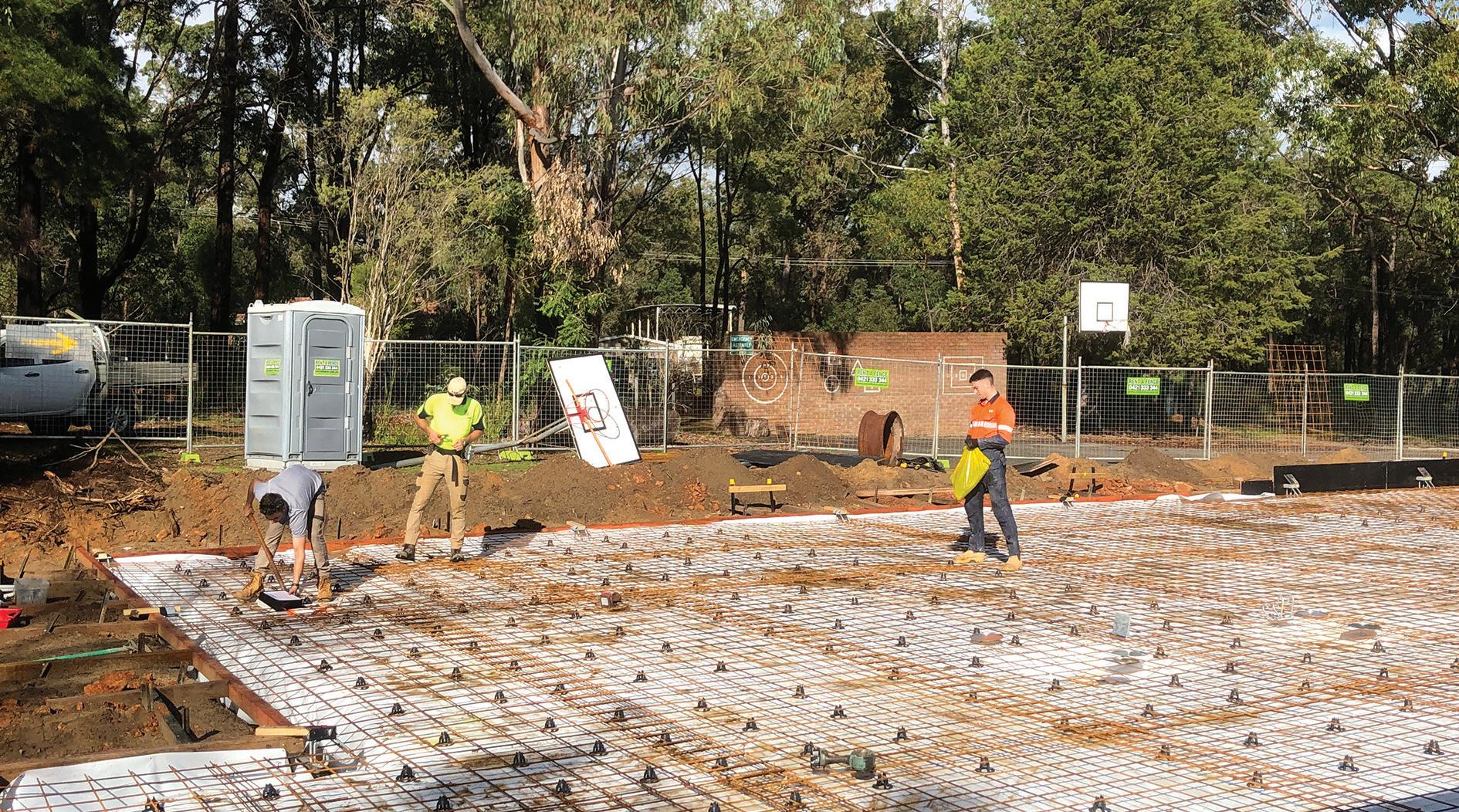
Mamarapha College received support from churches across Australia to help fund new buildings for administration and staff. In 2022, mission offerings were taken up to help fund the building of two general early learning areas, a computer lab, a student area, as well as the refurbishment of the administration block.
Mamarapha College first opened its doors to Indigenous students in 1997 for those wanting to receive training in gospel ministry. Since then, more than 1500 students have graduated and are serving in remote areas as well as large urban cities. The new General Learning Area (GLA) facilities are designed to cater for the growth trend in enrolments and provide additional spaces to deliver new vocational courses in the future.
The GLA was designed by specialised educational architects to provide a quality learning environment and delivery to a larger cohort of students compared to the old classroom capacity.
The administration building has now been fitted with much-needed storage space, additional offices, a staff workroom and a Faith FM studio. The new buildings and office have been in operation since early 2023, with the final addition of a radio tower yet to be completed.
“Many students have commented on the computer lab which is now three times larger compared to the previous one,” said Pastor David Garrard, Mamarapha principal. “Staff have expressed their gratitude for the extra room, new equipment, and furniture.”
Pastor Garrard said, “All staff and students consider it a great privilege to be part of this significant milestone in Mamarapha’s history. We are all praising God for making our dreams come true.”
Australian Union Conference (AUC) Aboriginal and Torres Strait Islander Ministries (ATSIM) director Pastor Darren Garlett said, “As a Church we value the work of God in the lives of people who have made a commitment to Him. Through Mamarapha College we witness this transformation happening in the lives of students each year as they embark on the study program.”
He continued, “Receiving financial support to enhance the facilities to make the Mamarapha experience even better is a real answer to prayer. We have a training centre where people can learn but it makes an impact as soon as they arrive on the campus.”
An evangelistic series in the Philippines had a significant impact on the island of Mindanao, welcoming more than 6000 newly baptised members. 10,000 church members gathered together to join the week-long fellowship, which was broadcast to 27 Adventist radio stations and eight TV stations.—SSD
If you’re enjoying our Record Rewind features this year, you might also find this newly launched podcast interesting. The General Conference’s “Mission 150” podcast tells the story of how Adventism spread and became the missionary enterprise it is today. “The first episode of Mission 150 explores the early discussions about overseas mission and reveals surprising facts about how most early leaders of Seventh-day Adventists had very limited ideas about mission,” said David Trim, Office of Archives, Statistics and Research director.—AR
Research from New Zealand shows that eating two kiwifruits in the evening can improve your sleep quality and mood and leave you feeling refreshed in the morning.—Massey University
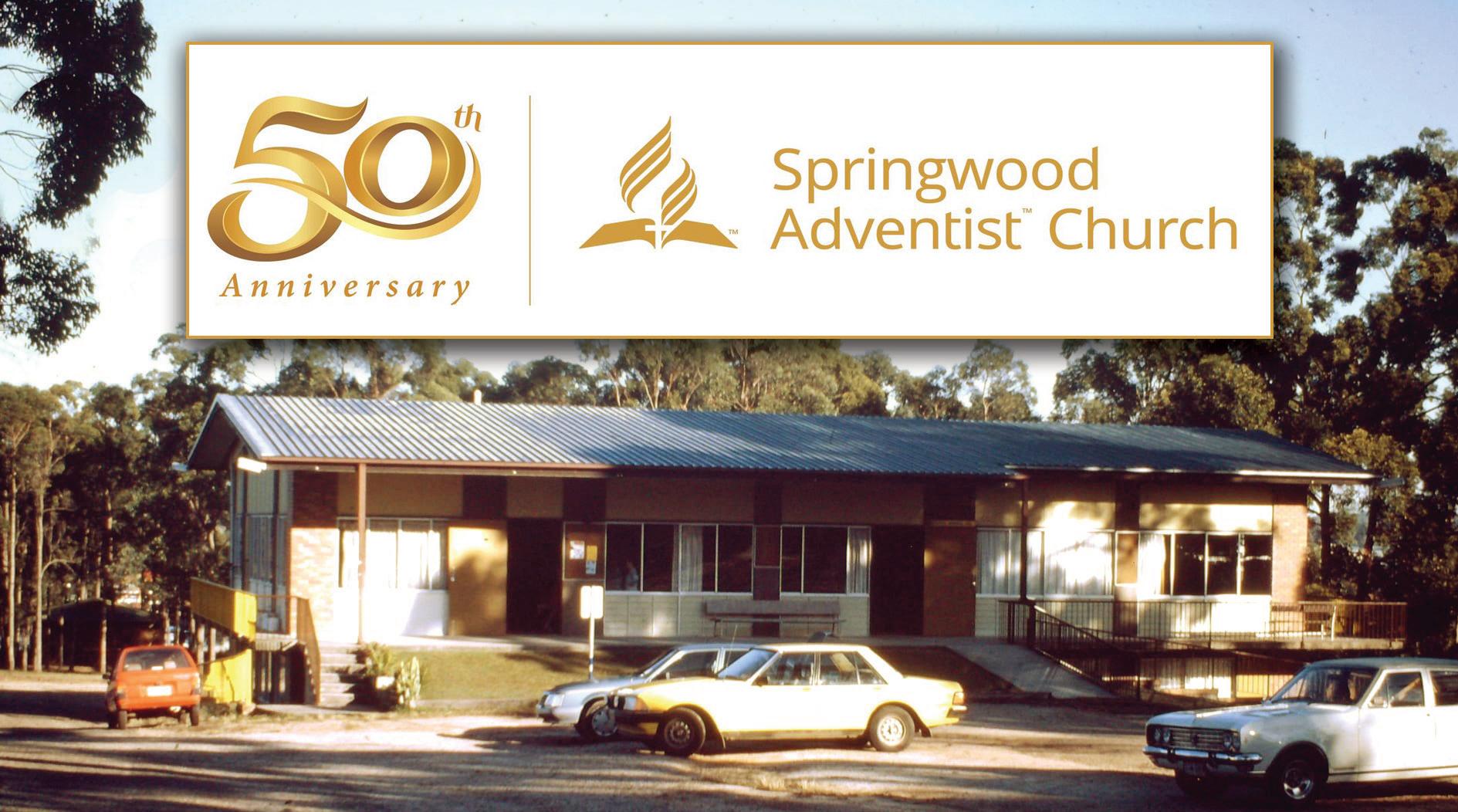
South Queensland’s largest Adventist church is gearing up to celebrate their 50th anniversary on May 13. Since officially becoming a church in 1973, Springwood Adventist Church has been a vital part of the local community with its links to ADRA Logan, and to the local Adventist school, Brisbane Adventist College. Formed from the Eight Mile Plains Adventist Church, a new group in Kingston started meeting. From that first meeting in 1971, to officially becoming a church in 1973, Springwood Adventist Church has grown and is now the largest church in Queensland, running two concurrent services each Sabbath morning. “The church has touched countless lives with its message of hope, love and service in the name of Jesus in the Springwood and Logan areas,” said church elder Loren Justins.—Loren Justins
The Sepik Mission (SM) in Papua New Guinea launched a new initiative themed “Sepik for Christ” on April 1 in the Maprik District of the East Sepik Province as part of the wider PNG Union Mission theme of “PNG for Christ 2024”. SM president Pastor Henry Monape explained that the Sepik for Christ campaign is just the beginning of a larger program that will extend across PNG throughout 2024. He explained that while the campaign will run for the next two years of the quinquennium and beyond, evangelism work has no time limit.—Serina
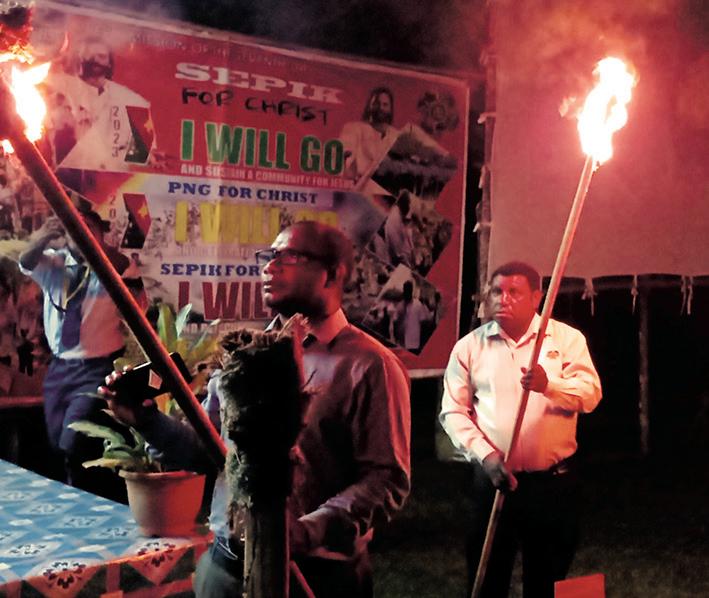 Yaninen
Yaninen
Suambukum, a small Adventist church founded in 2012 in the Maprik District of Papua New Guinea, has just 45 members but has managed to branch out to neighbouring villages, despite being a minority faith in the area. According to Suambukum local church minister Cosmos Maibogu, one of the biggest challenges the church faces is that many members are hesitant to publicly show their Adventist faith. Despite this challenge, the church has managed to function as an organised church and even has a Pathfinder and youth club for young people. Mr Maibogu credits the church’s success to “the grace of God and the support of key individuals such as elder Koney Samuel”, secretary of the PNG National Department of Planning and Monitoring.—Serina
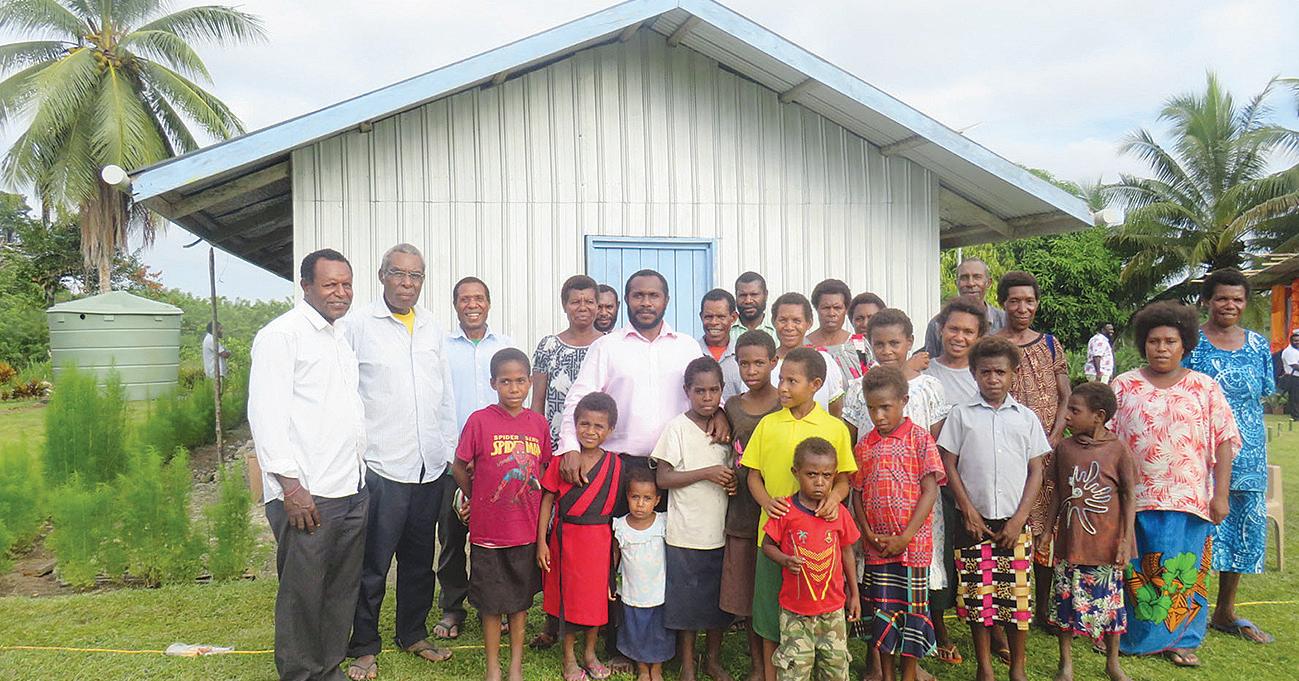 Yaninen
Yaninen
Kaitaia church in New Zealand has continued its longstanding tradition of community service projects by collaborating with other churches in the area. Under the theme “Crazy Love”, a team led by Pastors Keli Pepa, Moe Siaki and Mekuri Su’a and their families, recently rallied together to run a kid’s club for a few days and other initiatives aimed at building bridges with the community. The team also travelled to the Te Kao church to enjoy a time of fellowship.—Plugin

A group of 40 young adults from across the North New South Wales Conference (NNSW) recently volunteered for 15 days at the Koivikko Lifestyle Centre in Finland. The young people aided the team at Koivikko with multiple renovation projects, outreach in the community of Mikkeli and leading out in various local church services.
The property on which the Koivikko Lifestyle Centre is built was once a government boarding school facility that was bought by a local church in Finland. According to former NNSW pastor and Koivikko volunteer, Kyle Morrison, the desire of the local church is to “set up a community centre of influence, to teach lifestyle medicine principles and advance the gospel”.
Smaller teams also took part in letterboxing, which included walking through snow and ice to deliver evangelistic material. From this outreach, 22 people from the community signed up for the advertised health program and two people requested a copy of The Great Controversy
Avondale University Church associate pastor and mission trip organiser Morgan Vincent shared that the spiritual aspect of the trip was the highlight. “From the worships we had each day, you could sense throughout the two weeks or so we’ve been here, that people were growing in their faith. When you place people in the right environment, they can only grow,” he said.—NorthPoint/ Megantha Kiruwi
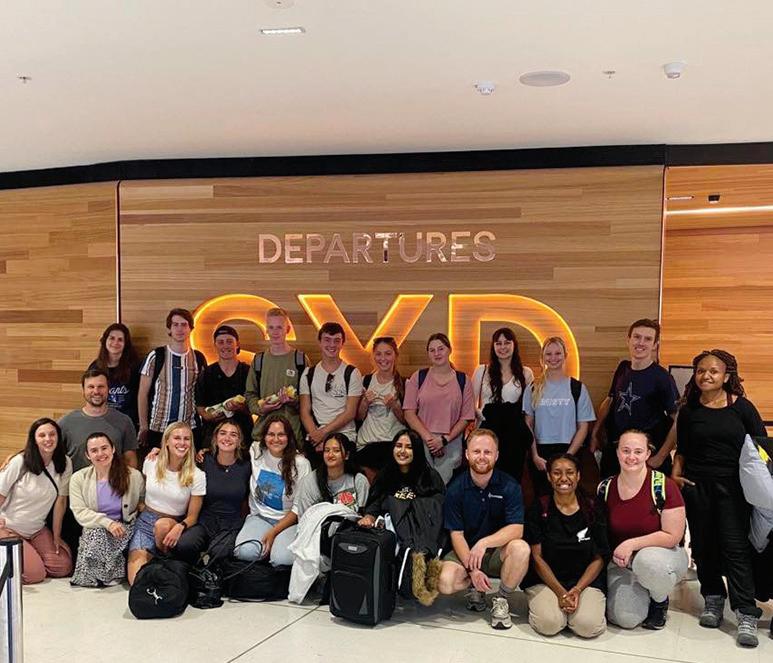
Send info and photos to <news@record.net.au>
Nine people were recently baptised on Vaitupu Island in Tuvalu, after months of personal visitation and Bible studies led by church planter and minister Waisele Dokonivalu. The event was a celebration of faith and new beginnings. Among those baptised was a man who, despite having a severe knee condition that required crutches, was still committed to walking into the water to be baptised. Mr Dokonivalu expressed his admiration for the newly baptised member’s courage, saying, “His faith is truly inspiring. He was a former member, but through Bible studies and personal visitation, he recommitted his life to God.”—John
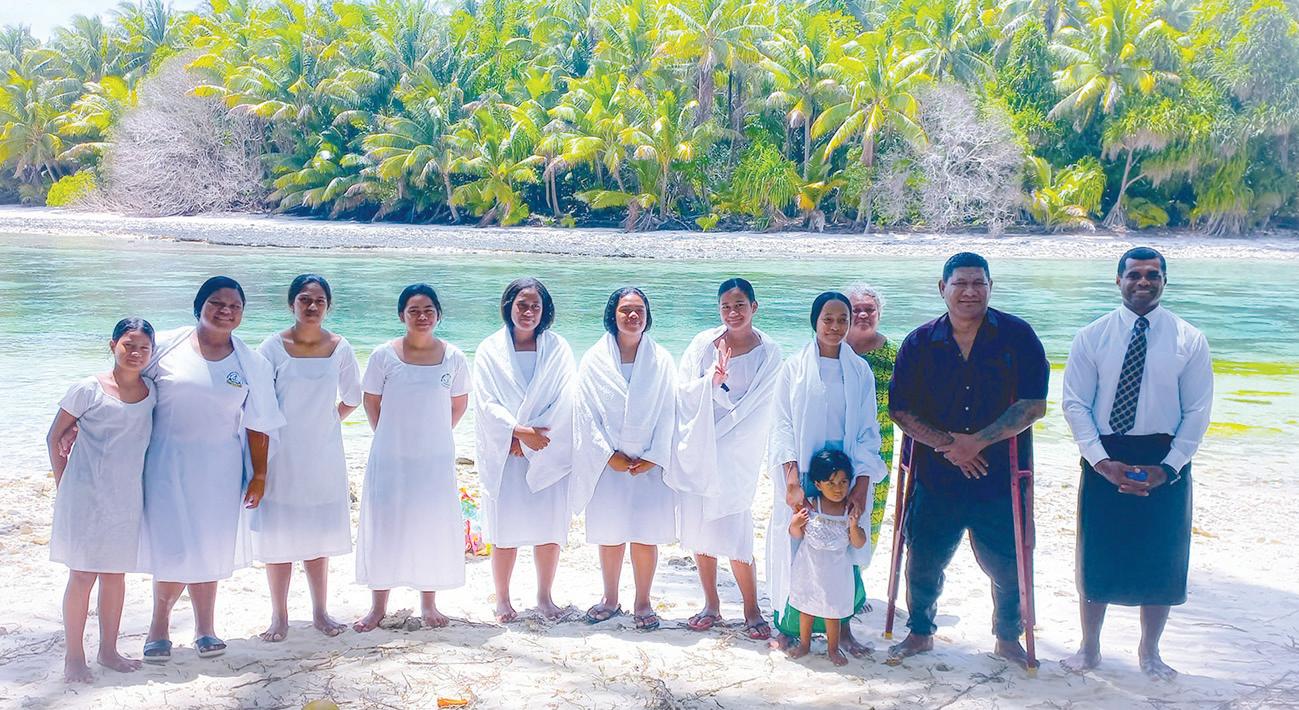 Tausere
Tausere
Communication leaders from across Australia gathered for the Australian Union Conference (AUC) communications advisory on April 3 and 4 to discuss current projects and new opportunities in media and communications. Held at the AUC office in Melbourne, the advisory meetings consisted of workshops, presentations, and discussions on topics such as collaboration with schools, artificial intelligence, digital discipleship, and more. South Pacific Division communication director Tracey Bridcutt and Adventist Record assistant editor Juliana Muniz presented on crisis management and the importance of sharing news stories. Reports were also shared by communication leaders from their respective conferences, highlighting different projects. “It was exciting to hear about some of the plans being developed by this group of talented and dedicated individuals,” said Mrs Bridcutt.—Kymberley McMurray
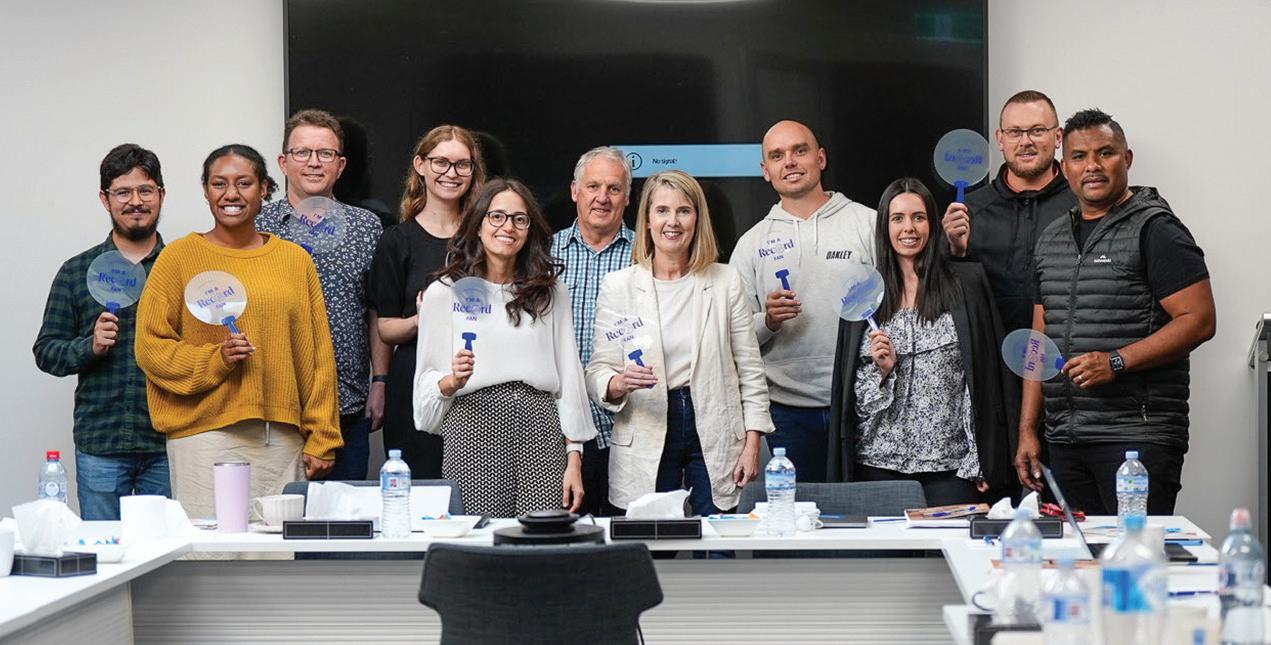






A cry is heard. New life has begun. A tiny, helpless baby is born. The one that, made you a mother. You’re a mum. No matter how, you got there. Birth, adoption. It made you a mum.












Imagine Mary. Knowing she, was carrying, the Son of God. I wonder how, she must’ve felt. Scared? Happy? Excited?
















Sarah laughed. She was old. 99 when she had Isaac. You’re no woman, from the Bible. You’re still a woman of God. We belong to God’s family.

That baby that, made you a mum. We pause to, celebrate you. You could be a grandma or great-grandma. We want to honour you. Even if you’re not a mum. Thank you for being, a part of a child’s life. A cry is heard. New life has begun. Happy Mother’s Day, to you all. You’re very much loved And you’re very special. May God keep blessing you.






































 De-anne Tasker Rockhampton Adventist Church, Queensland.
De-anne Tasker Rockhampton Adventist Church, Queensland.
become a status symbol. . . . People perceive others who are busy . . . to be important and impressive.” In other words, if you aren’t busy, you must either be worthless or lazy. Now, I know that life can get a bit too much to handle at times. But as I quoted in Record Live, “There is a time for everything, and a season for every activity under the heavens” (Ecclesiastes 3:1).
Sure, life is busy in the sense that I don’t have enough time to do everything that I would like to do. But is life so busy I don’t have enough time to do something I enjoy? To stalk people on social media?
I would have answered yes to those questions some six years ago. The season of being a mum to a young child was all-encompassing. Life was reduced to witnessing (and ensuring) my child go through a seemingly endless cycle of cry-eat-cry-sleep-cry-poop-cry.
Ashort while back, I did a Record Live on the topic “Dear God, I'd like to hang out but I've got kids”. In a way, it felt like a follow-up not only to “The Pregnancy Diaries” series of articles I wrote for Adventist Record back in 2016, but also to the piece, “Diary of a first-time mum”, published in Signs of the Times magazine a year later.
In those pieces, what started out as a strong sense of bewilderment that I would soon be a mother became fullfledged despair as I discovered how overwhelming life was with a newborn.
More than six years on, an infinite amount of unconditional love has mostly replaced the feelings of despair. One thing, however, remains: Overwhelm. The challenges have changed, but the feeling life is moving at a manic pace is the same. I suppose it doesn’t help that children also grow at breakneck speed. One minute they’re teething, the next minute they’re losing the very same teeth. One minute they’ve just started solids, the next minute they’re cooking dinner for you.
While the Record Live title was mostly tongue-in-cheek, there was a strong element of truth in it. Life is busy—and not simply for those with kids. While parents have the lives of extra (little) people to manage and while these same children may not grant us the ability to pay attention, especially during church services, everybody is busy.
It’s become a standard reply to “How are you?”. Some people even go so far as to incorporate the concept into their greetings: “How are you? Must be busy.”
As Adam Waytz wrote in “Beware a culture of busyness” in the Harvard Business Review, “Put simply, busyness has
Life was so busy God fell by the wayside. I knew I should be reading the Bible but my brain felt like mush whenever I had a spare moment. I knew I should be praying but I drifted to sleep whenever I closed my eyes.
If you are going through that season, I’d like to think God understands, since “the Lord looks at the heart” (1 Samuel 16:7). He is, after all, our best Friend—the kind you can pick up from where you left off . . . months ago. But remember, best friends only become so because they have previously spent copious amounts of time together. And even if they don’t (or can’t) anymore, they still find time for each other.
My busy season has waned and today, there’s an addition to my friendship with God—my son. We read the children’s Bible together, we pray together, we have discussions about God together. Even more precious are the times when my son teaches me about things he’s learned about God.
So remember, there is a season for every activity under the heavens. This means even if we do have busy seasons, it shouldn’t be our norm. Being busy will end, although I will concede the “season” may be longer for others.
More importantly, don’t let being busy define you. If you feel slightly awkward admitting you’re not busy, remember, “You are worth more than many sparrows” (Matthew 10:31) and even sparrows have time to sing.
Nowadays, when people ask me if I’m busy, I try to answer, “I’m adequately occupied.”
Melody Tan


According to Record reports, Adventists in this period watched the global conflict begin and grow with real concern. There are a number of articles that share how non-combatants and conscientious objectors fared in World War I as encouragement and comparison to what young men were now facing. One writer, H E Widmer, praises the Church for preparing young men for medical service and shares some of his experiences in the August 28, 1940 issue. There are also reports of missionaries being relocated or experiencing war first hand and, as the theatre of war moves to the Asia Pacific region, the Church grows more concerned. This report from the Union Conference Committee, entitled ”Facing a Grave Situation” (July 1, 1940), details some of the church’s decisions in responding to the crisis. It also demonstrates some of how they saw World War II and what had to happen, alongside their call to mission.
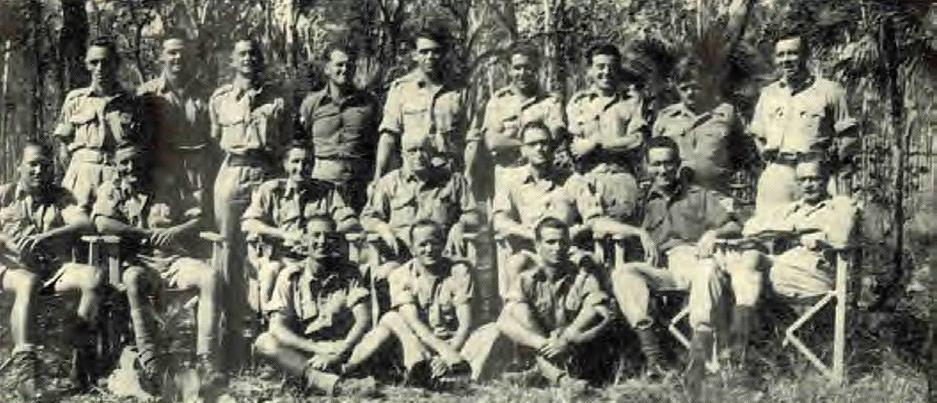


”The awful situation into which we have been brought by the exigencies of war has caused the Union Conference Committee much anxiety. For instance, our whole island situation may be changed so seriously by international complications that it may be necessary to evacuate our white missionaries. For all this and many other problems the Executive Committee has had to plan.
Then there are contingencies to provide for in case of the invasion of our homeland; and many other matters may arise, each of which has received careful and prayerful consideration by the Committee. Among these problems, consideration has been given to the advisability or otherwise of holding our camp-meetings this season, because of the tremendous difficulties of transportation and other obstacles which face us.

After viewing this matter from all angles, it was unanimously decided that we should cancel all of our camp-meetings for the present, and that we should offer to the Government the use of our tents for military camps. At present there is a need for housing accommodation for thousands of men who are being called up for the defence of our shores. We have sufficient tents to provide accommodation for five

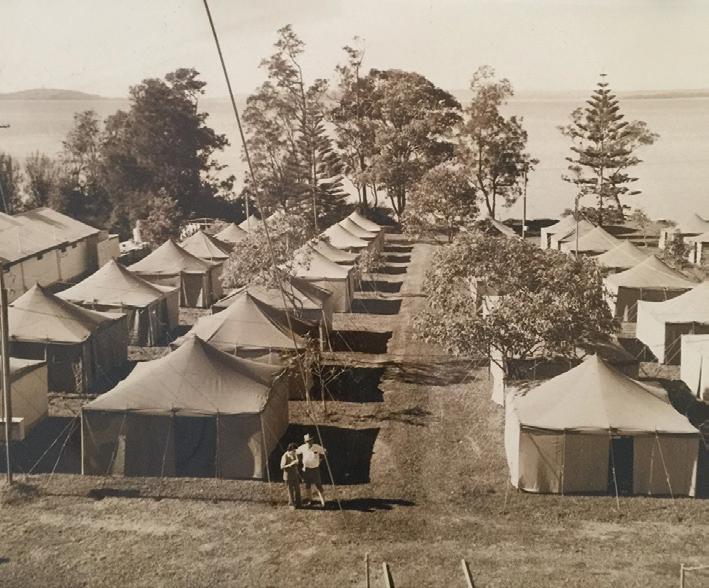
thousand men. To hold such valuable and useful equipment in our store at a time when the country is in dire need of accommodation for thousands of the men who are sacrificing their business and professional careers in order to defend Australia from invasion, seemed to the Committee to be very wrong.
Our Christian principles forbid us to engage in combatant service in the defence of our country, but those same principles do not forbid us from rendering such service as we can conscientiously contribute towards the defence of our families, our homes, our churches, and our liberties; for it cannot be too often asserted that if our enemies should succeed in overthrowing the Empire, then we shall lose the inestimable privileges which we now enjoy, and which have cost our ancestors their life’s blood to gain for us.
This struggle for world supremacy threatens to rob us of the right to think for ourselves; it threatens to take from us not merely the divine right to govern ourselves as a democracy, but to substitute a pagan form of religion for Christianity. In view of such a contingency it seemed to the Committee that the Church should make some practical contribution towards the defence of its very existence. Therefore it was unanimously voted that instead of using our tents for ourselves, we should place them at the disposal of the Government at such a time as this.
No other organisation in the Commonwealth has such a fine camp equipment as we possess. When the nation is bending every energy to preserve our liberties, we should not withhold that which would provide such a timely and valuable assistance to the Government at this time when our very existence is threatened.



While our people will doubtless be disappointed at missing their camp-meetings, we feel sure they will recognise the tremendous difficulties of holding our camps this year, and will also appreciate the fact that by denying themselves of the privilege of meeting in camp they are providing comfortable shelter for thousands of our fellow citizens who are manifesting such an unselfish spirit for the sake of our country.”


Have you ever thought you would like to be a missionary? You can be!!!
In 2022, Warragul church, a small rural church in Gippsland, Victoria, answered the call to support projects in the Solomon Islands Mission (SIM).

Our church family decided to make donations for muchneeded evangelism equipment for the remote Santa Cruz Islands. By simply making small sacrifices, we were able to supply them with everything they needed to be independent in running their own evangelism programs. A PA system, projector, three laptops, microphones, HDMI cables, splitter, printer for printing Bible studies and a generator to run the equipment.
A family who attend Warragul are dedicated to printing and distributing Steps to Christ (STC) and The Great Controversy (TGC). They generously donated 2000 of each book to send to SIM. Along with the books, we collected and sent requested donations of clothing and paid for the shipping.
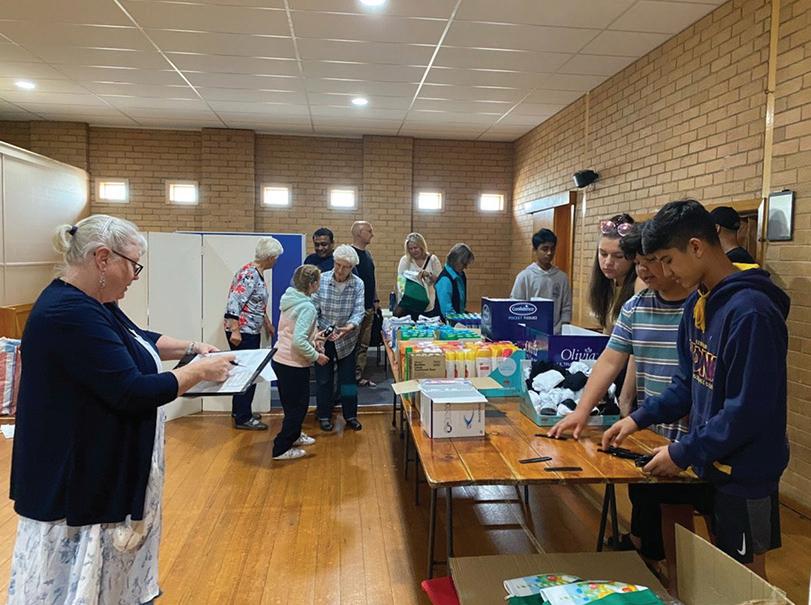


Our church responded to another urgent call in the village of Nyibanga Noi, a remote community with no access to fresh water. They rely on coconut water to drink. We purchased two 5000 litre water tanks and as a result, the one Adventist resident in the village now has three families worshipping on Sabbaths in her home.
The amount we raised was $A12,000—a modest amount but it will continue to make a huge difference in the lives of the people of the Solomons. I wish I could tell you the stories of how the Lord blessed and intervened during this process. God miraculously made the money stretch further, allowing us to send more items than we had originally planned. Perhaps I can share more stories with you in another article.
This year the Solomon Islands project for Warragul church, is to raise funds to help purchase land and build a church and pastor’s home (we've already provided a deposit to secure the land). You're probably thinking to yourself, that’s an impossible task, such a project in Australia would cost millions of dollars
However, the estimated amount to accomplish the project is $A30-35,000. If Warragul can raise $12,000 again this year and if two other churches joined us, it could be purchased, built and running in 2024.
There are many other opportunities for service. It’s been my joy to work with Pastor Errol Wright and Pastor Ray Eaton, retired pastors who were Solomon Islands missionaries. They both continue to work tirelessly for the wonderful people of the Solomon Islands. Pastor Errol has raised funds through the Tumbulgum church community in NSW to purchase Bray Boats and Outboard Motors, to enable church workers to move from island to island, sharing God's Word. Pastor Ray is passionate about education and was recently able to fill two containers with desks and chairs for some of our schools. He kindly gave us room in his container to include our equipment, saving us the cost of shipping.
Another opportunity exists in the village of Taipe. Taipe has built a clinic and community leaders there approached SIM to operate the clinic for them. What a wonderful opportunity. It would only take $A30,000 to set up. Unfortunately, due to a lack of SIM resources, they could not take up the opportunity. These same community leaders have expressed a desire for Adventist Education to set up a secondary school there, so local children can have an opportunity to go to university.
If more church communities could become missionary churches, like our little church here in Warragul, we could find the resources needed to help run the clinic and school in Taipe and many other projects.
If you would like to become a missionary church, contact me at <lorrainejmitchell44@gmail.com> as I'm happy to talk to you about starting your own project or sharing ours. May your hearts be stirred by the Holy Spirit to help finish the work, so Jesus can come back and take us all home.
Lorraine Mitchell (née Henry) Warragul church, Victoria.On September 8, 2022 His Royal Highness Prince Charles Philip Arthur George, Prince of Wales, KG, KT, GCB, OM, AK, QSO, PC, ADC, Earl of Chester, Duke of Cornwall, Duke of Rothesay, Earl of Carrick, Baron of Renfrew, Lord of the Isles, and Prince and Great Steward of Scotland, became king of the United Kingdom of Great Britain and Northern Ireland. Of course, this ascension to the throne was overshadowed by a more widely publicised event: the death of his mother, Queen Elizabeth II. The ensuing period of mourning, followed by extended funerary proceedings, captured the attention of both Commonwealth nations and the rest of the world. In many ways, the death of the queen marked a transition period for many billions of people. Whether or not you are a subject of the British monarchy, for many of us Queen Elizabeth II was a symbol of stability, normalcy and steadfastness. Like a security blanket or a familiar song, regardless of the ever-changing tides of world events, one thing you could always count on was the queen. For most of us, she was the only British monarch we knew. She was queen long before I was born, as well as before the birth of both of my parents.
However, this article isn’t about Queen Elizabeth II—it’s about her son. He’s the first British monarch to be crowned in the 21st century as well as the first since 1953: 70 years if you’re counting. That’s more than 70 years of preparing for the job he’ll have until it’s his turn to be buried like his mother before him and his grandfather before her.
And this waiting period hasn’t been one of silent anticipation. The press, the public and the royals alike have all, at various times, voiced their ever-changing opinions on what is in store for us once he takes the throne, and indeed whether he should at all. Where his mother had the advantage of a relative lack of public scrutiny prior to her father George VI’s

sudden death, the entire world has had the better part of a century to deliberate on the prospects of a King Charles III. To say the jury’s out would be the understatement of said century.
First, there’s his name. Perhaps unfortunate, and certainly not his fault, but there has been some distaste toward the name “Charles”, and for good reason. King Charles I’s reign (1625–1649) was marked by political turmoil. Ironically, much of this tension was fuelled by arguments over the place of the monarchy and exactly how much power it should wield. His inability to govern well led directly to the English Civil War, which resulted in his beheading at the order of Oliver Cromwell in 1649. His eldest surviving son, Charles II, spent most of his life in exile, not ascending to the throne until 1660. His reign saw the Great Plague ravage Europe, the Great Fire of London destroy much of his capital and finally the dissolution of Parliament until his death at the age of 54. Some historians suggest he may have inadvertently poisoned himself with mercury but the official cause of death remains unknown to this day.
But what has been scrutinised more than his name is the character of the man wielding it. The 74 years Charles has been in the public eye has allowed the public to form an opinion on him influenced by tabloids, leaks and correspondence between him and other members of the royal family. Journalist Sally Bedell Smith wrote about this in her 2017 biography Prince Charles: The Passions and Paradoxes of an Improbable Life. Having met the man several times in person, she on the one hand presents his public persona as warmer and more genuine than some tabloids would have you think, while on the other hand revealing the character flaws that create a series of ever-cascading contradictions. On the one hand, he is an avid environmentalist, deeply concerned about disappearing animal species and sustainable housing. On the other hand, he reportedly becomes irate when forced to fly first class (rather than private jet) and takes a leather toilet seat with him wherever he goes.
In his earlier years, he was also typecast as a typical “richkid playboy”. This image was fuelled, perhaps unfairly, by his great-uncle and confidante Lord Mountbatten, who encouraged him to “sow his wild oats” before settling down to an appropriate match. Charles was never comfortable with this identity and seemed passionately intent on finding a partner. First with Camilla Shand, then with Diana Spencer. The latter’s popularity and lack of deference to royal convention created a sore spot in the couple’s marriage. Their messy divorce (fuelled by both partners’ extramarital affairs) and Diana’s untimely death solidified her in the eyes of the British public as a veritable saint with Charles portrayed as a bitter, jealous villain.
Whenever we have discussions about the monarchy, I can’t help but consider its messy history. There seems to be a human instinct to elevate certain other humans to the station of almost-divinity in the office of the monarchy. Mesopotamian cultures such as the Assyrians, Elamites, Neo-Babylonians and others equated the office of king with familial connection to the gods. Quite literally, the king would often be
called a “son of the gods”, thus giving his rule divine legitimacy. In Assyria, the king’s titles included: “Great King, Mighty King, King of the Universe, King of the country of Ashur” and so on. He was not only the supreme lawmaker, administrator, commander-in-chief, he was also Ashur’s (the chief god of Assyria) divinely appointed representative on earth.
In 1 Samuel 8, the prophet Samuel is growing old, and the elders of Israel are concerned about the line of succession. They convene a council at Ramah and petition him to appoint a king to lead Israel. Samuel is not pleased and it’s easy to see why. He says to the people in 1 Samuel 8:11–18 (I’m paraphrasing here): “this king will take your sons and turn them into soldiers, farmers and blacksmiths. He will put your daughters to work baking bread, cooking food and attending to all his needs. He will tax you, take your land, livestock and produce. He will make you into his slaves and you’ll cry out to Adonai, but He won’t hear you.” Why does Samuel say this? It’s no great mystery—he’s seen what the Sumerian, Babylonian and Hittite kings do to their people. He knows that humans are prone to corruption and that given the chance at ultimate power, anyone can abuse it. If you know anything about the Israelite monarchy, you know Samuel was right.
Fast-forward to 33 AD and we see a vastly different picture. Atop a hill outside Jerusalem, on a Roman execution device hangs a Jewish Rabbi. He’s flanked by two thieves and is suffering a fate reserved only for the worst criminals in the Roman empire. The only notable feature is the sign that hangs above His head. It simply reads: “The King of the Jews”. Was it meant to honour this dying man? Or was it sarcasm, satire or a warning against any others who might attempt to rise against the emperor and his Imperium?
The death and resurrection of Jesus of Nazareth was the catalyst for what has gone on to become one of the most enduring and impactful faiths in human history. Today, no-one gives deference to any Assyrian, Egyptian or Roman god. Even the British monarchy, which at one point held itself up to a standard almost approaching divinity, has in recent decades revealed itself to be exactly what it has always strived to avoid: conflicted, messy and ill-equipped to handle its own authority—in other words, decidedly human.
It comforts me then to know that the God of the universe went against the grain. I’m thankful that Jesus, though He was equal with the Father, chose to become a human rather than cling to His divine privileges. I’m awed by the way He chose to be born into a poor family from an obscure part of the Middle East. I can’t conceive of the self-sacrificing humility it took to allow Himself to be killed for a crime He didn’t commit, even when at any moment He could have exercised His kingly power to stop His captors.
So, don’t take this as a discouragement from watching the upcoming coronation. It will almost certainly be playing in my household (that much is out of my control). But, while you watch it, I encourage you to remember the true King above every other king. No offence to Charles, but the grandeur and majesty of his rule pales in comparison.
Jesse Herford associate editor, Signs of the Times
Two of the most interesting books of Adventist history published in the past year offer alternative views of the relationship between Adventist faith and fundamentalism. It is one of those arguments that we might be tempted to dismiss as merely academic or primarily semantic, but this topic matters because of the direct connections to many issues we continue to wrestle with in the Church today—and also some of the things we don’t wrestle with, that we take for granted as just the way the Church or the world is and ought to be.
As a sequel to 1919 and his study of the pivotal Adventist Bible conference of that year, Michael Campbell’s 1922* traces the further development and effects of a turn to Adventist fundamentalism in the 1920s.1 Influenced by similar movements in the wider culture and particularly among Christian churches in the United States, Dr Campbell argues that key theological, cultural and even political developments within the Adventist Church constituted a significant fundamentalist turn, albeit with some uniquely Adventist features, which has profoundly shaped the development or not of Adventist faith and life in the century since.
Offering an alternative assessment is Ostriches and Canaries—Gilbert Valentine’s study of the tension between fundamentalists and progressives, between administrators and
academics, in the Adventist Church in the 1960s and ’70s.2 Dr Valentine argues that Seventh-day Adventists have always been fundamentalist, an assumption that has re-asserted itself at key points in Adventist history including the 1920s and ’30s, the 1970s and ‘80s, and perhaps again in the past decade. Of course, this paints early Adventists as proto-fundamentalists, given that the term only came into common usage with the larger cultural trends of the early part of the 20th century, but the argument is that key planks of fundamentalism, such as the inerrancy of the Bible, were assumed by many of the earliest Adventist pioneers and have been largely maintained throughout most of Adventist history.
Perhaps I am exposing my Adventist nerd-dom, but I find it an intriguing point for friendly debate. There is a sense in which both perspectives are helpful to our understanding. Putting aside questions around the use of terminology, there was the possibility and practice of fundamentalism in our earliest Adventist thinking, but there are aspects of our Adventist fundamentalism that were not possible until the 1920s. There might also be a recency bias in this assessment, but it seems that our fundamentalist turn 100 years ago has had a more profound influence on what Adventism is today and—perhaps more significantly—what it is not.
The history between Adventism’s proto-fundamentalism and the adoption of a more fundamentalist identity in the early part of the 20th century was spanned and guided by the ministry of Ellen White. Her life and work gave Adventists an up-close perspective on key questions of inspiration, demonstrating how God works through people to speak and guide in the community of His people. The presence of this phenomenon affirmed the reality of inspirational influence, reminded them of how it could be awkward and confronting, and guarded against the excesses of expectations of inerrancy. At least it should have—and then Ellen White was working among them to offer a corrective voice, as needed.
Looking back on Ellen White’s ministry and experience, it is also possible to trace the maturation of her spirituality, thinking and leadership. In some aspects, this was sketched a few years ago in Alden Thompson’s book Escape From the Flames3 and it is a theme that has seen more academic attention in recent years. It can also be observed anecdotally in surveying Ellen White’s books and the sharpening focusing on the centrality of Jesus to our Adventist faith in her writing of her later decades, particularly the 1890s and 1900s.
Unquestionably, Ellen White urged and maintained a high view and understanding of the Bible. As General Conference president A G Daniells summarised her work and focus in his eulogy at her funeral in 1915—perhaps with some hyperbole—“No Christian teacher in this generation, no religious reformer in any preceding age, has placed a higher value upon the Bible. . . . Those who still believe that the Bible is the inspired, infallible word of the living God will value most highly the positive, uncompromising support given this view in the writings of Mrs White.”4
However, the early Adventists also sought what they described as “present truth”, expecting that they would continue to learn and seeking to apply biblical principles to the changing realities of their times and places in ways that would be practical and transformative. This was an approach to truth and its practices also championed by Ellen White. Quoting Daniells’ eulogy again: “Through the light and counsel given her, Mrs White held and advocated broad, progressive views regarding vital questions that affect the betterment and uplift of the human family, from the moral, intellectual, physical, and social standpoint as well as the spiritual.”5
This perpetual seeking after and progressive application of truth was a substantial moderation of Adventism’s proto-fundamentalist assumptions, leading them beyond the narrow certitude of its earliest days. It was only after Ellen White’s death—with her matured, Christ-centred, progressive voice diminished—that a turn to 20th-century fundamentalism was possible. We could have responded differently to the questions and pressures of the 1920s, but this was a turn that caused the most damage to the ongoing influence and legacy of even Ellen White’s ministry, as both her fiercest supporters and harshest critics demanded yet more from her writings. This was a turn that continues to shape the Church today.
While there is a spectrum of thought, belief and practice
within the Adventist community, this entire spectrum fits firmly within a small slice of the conservative spectrum of the larger Christian world. When we are arguing about different ways of reading and applying Bible verses, it is almost always a conservative position arguing with a more conservative position. But the tendency—or temptation—to turn to fundamentalism has stifled our ability to think broadly and engage positively with social issues and needs in the world around us.
Our drift toward fundamentalism has led us to spend undue time defending not so much the indefensible, but the unnecessary. In “defending” both the Bible and the writings of Ellen White, apologists have mounted elaborate and sometimes disingenuous arguments that have created ever more problems, twisting ourselves into fundamentalist knots.6 This tendency has also seen our public witness too often co-opted by conservative political assumptions and attitudes.
By nature, we are a conservative Church. But to be most true to our tradition, we are also called to be progressive, in learning and in responding to the world around us, and in including everyone we can in the invitation of God (see Revelation 14:6). If this sounds like mere academic debate or even just an argument about defining technical terms, it might be because we have not yet put what we say we believe into practice and set about that humble task of changing the world. As Ellen White herself put it, “If God's word were studied as it should be, men would have a breadth of mind, a nobility of character, and a stability of purpose rarely seen in these times.”7
In the 1920s, we had a choice to be different; in the 2020s, we have a choice to make a difference.
1. Michael Campbell, 1922: The Rise of Adventist Fundamentalism, Pacific Press Publishing Association, 2022.
2. Gilbert Valentine, Ostriches and Canaries: Coping with Change in Adventism, 1966-1979, Oak & Acorn Publishing, 2022.
3. Alden Thompson, Escape from the Flames, Pacific Press Publishing Association, 2005.
4. Life Sketches of Ellen G White, page 471. Note that he used the word infallible, not inerrant.
5. Life Sketches of Ellen G White, page 473.
6. For example, consider the defence of slavery as part of making a case against the ordination of women as happened in the Theology of Ordination Study Committee or see an examination of another example of this tendency: Ronald Osborn, “True Blood: Race, Science, and Early Adventist Amalgamation Theory Revisited,” Spectrum Magazine, Vol 38, No 4, Fall 2010.
7. Steps to Christ, page 90.
*If you would like to watch an interview about 1922 with Dr Michael Campbell, visit Adventist Record's YouTube page and find the Record Live broadcast ”The rise of Adventist Fundamentalism” dated March 29.
Nathan Brown book editor, Signs Publishing Company.

This heart-healthy smoothie is a great source of dietary fibre and packs a nutritious punch.
Ingredients
2 Weet Bix™ Cholesterol Lowering

1 banana–fresh or frozen
1 cup baby spinach leaves
¼ avocado
1 cup So Good™ Almond Milk Unsweetened
Method
1. Place all smoothie ingredients in a blender and pulse until smooth.
2. Pour smoothie into a bowl. Top with extra fruit, nuts and seeds, and serve immediately. Nutritional
Almond milk is made from blending almonds with water. Of course you can't ”milk” an almond, but the result is a delicious lactosefree, dairy-free liquid with a subtle nutty flavour profile.
Is almond milk good for you?
Yes! It’s lower in kilojoules and saturated fat than dairy, and naturally cholesterol free. Almond milks naturally contain vitamin E, an antioxidant that protects the body’s cells.
You can also find almond milks fortified with additional nutrients such as calcium, B2 and B12 vitamins, protein, phosphorus and potassium.
Does almond milk contain protein?

It contains a small amount of naturally occurring protein (1-2g per glass); however, you can find some that are fortified with plant protein.
Can babies and children have almond milk?
While fortified almond milk is a nutritious plant-based alternative to regular dairy milk, it doesn’t contain as much protein as other plant-based milks, such as soy. For this reason, nutrition experts don’t recommend almond milk as a complete replacement for dairy milk for children under five. Toddlers need both protein and fats to help keep up with the demands of their rapid growth and development.
That doesn’t mean it can’t be part of your child’s diet. Just look for an unsweetened, plain almond milk that has been fortified with calcium and B vitamins, like B2 and B12.
What are the best uses for almond milk?
Choose barista varieties for hot drinks such as lattes or hot chocolates. Low kilojoule, unsweetened almond milks are a great base for protein shakes or morning smoothies, while regular almond milks add a delicious nutty flavour to your morning cereal or cooking.



Onesimus has run away from his master Philemon. When Onesimus meets Paul in prison, he learns about Jesus and wants to do the right thing and serve his master again. Paul appeals to Philemon to take Onesimus back and not punish him. Through Jesus, God accepts us unconditionally and reconciles with us, no matter what we have done. God also helps us to unselfishly accept others and show true love, forgiveness and a spirit of reconciliation.

lhel"e al"e foul" shapes. D1-aw

SU DO 1,11' U then, in the boxes so tl,at each foul' " squar-es contain a diffel"ent shape.

Philemon, Paul, prison, serve, ♦ ■ ♦

■ * * ■ ♦ ■ ♦ * -ME�OR�e �,:���. 9irt

■ *
Wthecl OP S
5:23, 24 I N G p Q u H u L H M M N T F I G L y X M L A F y K Q E 0 0 w V p M E R X p R 0 L G A G Q N I I u s F w C V s E z M N E I y E B 0 u C u R p C L L D Q R E A A L T A R R D N 0 C N u
I was really pleased to see the latest Adventist Record with regards to addressing pornography openly. Great work! Please do more.
Soulrefiner.com is another great resource for those wanting to heal from pornography addiction.
Just a little bit of feedback that hopefully might be helpful. I just wanted to note as a pastor who has been clean for nine years from a 20-year pornography addiction—there are suggestive pictures just before the article (p12) of Eve with partially shown breasts (animated pornography is a massive issue also) and on the bottle (kneeling woman) in the ”First Drink: the intoxicating vice of porn” article itself.
For those who struggle with pornography addiction this is like: ”let’s talk about how to get free from cocaine—but here have a tiny hit before we discuss it.”
If pornography addiction is such a big issue, please let the Record be a place where the men and women struggling with the issue aren’t
enticed. The content may be great but I’m not going to read it without my wife sanitising the pictures with a large permanent marker. (While I understand that I’m seeing it from a pornography addict’s mindset—the numbers now say that this is the majority mindset.) I also don’t want my kids to see it. I discuss the issues with them openly but I am not putting those images before them.
May God bless you and your work greatly. I am very thankful that this article was in the Record
Tim Turner, NSW
Re: ”Waco anniversary calls for Adventist reflection” (Feature, April 15). The FBI should have gone about that WACO problem with care. A lot of innocent people died and would have been terrified.
We have a friend who was an excellent policeman at Bright. An article by Ita Buttrose was written about him in the WOMEN'S WEEKLY, years ago. He left the police force because too many police were gun
happy. People who join police should have character references.
Rosita Frost, Vic
Re: ”Waco anniversary calls for Adventist reflection” (Feature, April 15). This was such a great read. It is absolutely terrible what happened to all of those people and especially the children. Heartbreaking.
Kstrick1720, via Instagram
Re: ”Waco anniversary calls for Adventist reflection” (Feature, April 15).
There is a podcast by the BBC called ”End of Days” that did a great job looking at how a large group of British Seventh-day Adventist people were recruited and moved to Texas. Well worth the listen and interviews with survivors, some of [whom] are still true believers.
Peter Aitken, via Instagram
ANDERSON, Edna (nee Godfrey), born 1.10.1934 in Auckland, NZ; died 27.1.23 in Corryong, Vic. She was predeceased by her parents, Charles and Gladys; sister, Ella; and stepsister, Ellen. She is survived by her son, Malcolm. Edna was a recognised and respected, loved and valued member of the Upper Murray and Corryong communities. She will be remembered as a lovely, kind and gracious lady with a ready laugh, beautiful smile and sharp intellect. She was a beautiful person and wonderful mother. Her’s was a life well-lived.
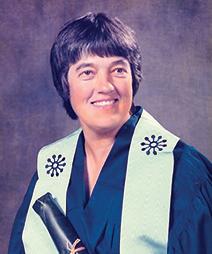
HASSE, Raymond John, born 2.3.1937 in Wellington, NZ; died 4.12.22 in Oxford. He is survived by his children, Rosalie and Michael Proud (Kaiapoi), Derrick (Taupo), Trisha McAllister-Hasse (Kaiapoi), Calvin (Oregon, USA) and Andrea and Tony Galway (Karamea, NZ). Ray was a very loved father and a great dad. He worked at the Sanitarium Health
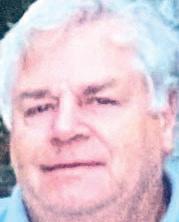
Food Company all his working life as a truck driver over all of New Zealand. He also spent many years running Pathfinders. Now resting in peace until Jesus comes.
WALLACE, William Rollo, born 8.12.1932 in Cooranbong, NSW; died 2.8.22 in Hamlyn Terrace. He is survived by his wife, Ruth (Nords Wharf); son, Kevin (Nords Wharf); daughters, Jillian (Wallsend), Karen (Sydney) and Lynette (Bowral); and grandchildren, Ryan, Andrea, Adrian, Vincent and Francesca. He was a man of integrity and faith who lived his religion in a practical way. He generously shared his abilities and resources with his church and community. He was loved and respected by all who knew him. Now asleep in Jesus awaiting the glorious resurrection morning.
Fred ChilesheWOOD, Robert Frank, born 5.6.1930 in Geraldton, WA; died 29.3.23 in Cooranbong, NSW. In 1954 he married Thelma Bates. Bob was predeceased by his son, Murray in 1980. He is survived by his wife; and children, Kingsley, Kelvin, Andrea, Pauline and Marcia.

Bob attended Carmel College where he met Thelma. He spent most of his working life in church employment. He worked at the Warburton Hospital and Hydro, two leprosy hospitals in PNG and the Sydney Adventist Hospital treatment rooms. He retired in the 1990s and moved to Allora, Qld where he ministered faithfully in the Warwick church as senior elder for many years. It was evident to all that Bob was someone who loved his Lord, his family and his church.
Warren FedorowTRAVELLING NORTH QUEENSLAND?
Come stay with us at Riverside Convention Centre while visiting Townsville. Check out our Facebook page or email <admin@ riverscc.com.au> or send Di a message at 0406 871 514.
LAKESIDE RETREAT HOLIDAY
ACCOMMODATION overlooking beautiful Bonnells Bay at Lake Macquarie, NSW. Peaceful and quiet one-bedroom
self-contained flat, sleeps two. Very spacious and comfy. $A135 per night. Email<relax@ lakesideretreat.com.au>.
ABSOLUTE CARE FUNERALS
The Adventist family owned and operated business, caring for you from Sydney to Newcastle and Wollongong. Contact Arne Neirinckx, who understands our Adventist philosophy. Contact us on 1300 982 803 or 0408 458 452 or <arne@absolutecarefunerals. com.au>, even if you have already paid for your funeral.
SABBATH SCHOOL LESSON ON AUDIO CD
Christian Services for the Blind produces an audio CD of the Sabbath school lesson quarterly for those with vision impairment. If you or someone you know could benefit from this free service please contact us. Phone: +61 (0)2 9847 2296. Email <csfbhi@adventistmedia.org. au>. Post to Christian Services for the Blind, Locked Bag 1115, Wahroonga NSW 2076.
Rojé’s journey from Uganda to Australia and how poetry helped him explore moments of loss, isolation and fear.

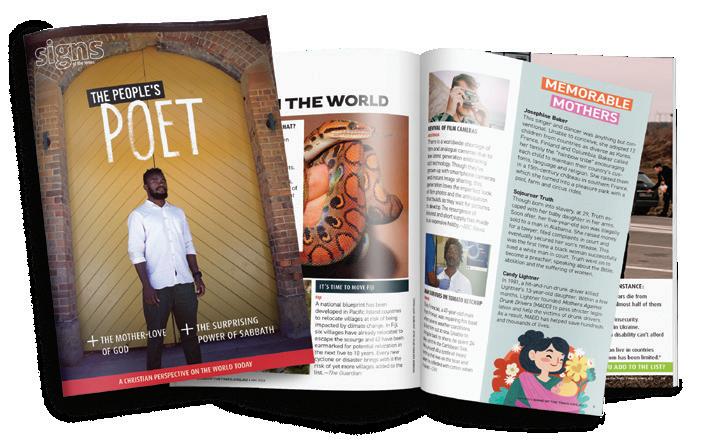
THE SURPRISING POWER OF SABBATH
How observing it might save your life.
EMBRACING SUNLIGHT
The many benefits of sunlight and how to enjoy it safely.


Why is everyone so angry?

Is it true and what can we do about it?
PER YEAR
Signs of the Times is a great way to share your faith with friends who don’t yet know Jesus. Read for yourself and then ask, Who do I know who would enjoy this article?
GOROKA, PNG
Adventist Aviation Services is seeking applications from qualified pilots for the position of flight operations manager. The ideal candidate would be an experienced pilot with preferably three years aviation management experience, 750 hrs PNG time or similar experience and an instrument rating. Interested candidates who are active Seventh-day Adventist members, mission oriented, professional, hard working and adventurous, with commercial aptitude for business management are encouraged to apply. For more information, please visit the South Pacific Division’s human resources website <adventistemployment.org.au>. All applications, including your CV, three work-related referees and a reference from your church pastor, must be forwarded to Human Resources, Seventh-day Adventist Church (Pacific) Limited, Locked Bag 2014, Wahroonga NSW 2076 Australia. Email <hr@adventist. org.au>. Fax (02) 9489 0943.
Applications close May 31, 2023.
MAMARAPHA, WA
Expressions of interest are sought for people interested in serving Mamarapha College as volunteer board members to fill current vacancies. In harmony with the constitution, the majority of appointed persons must be Indigenous Australians. Currently, we are seeking candidates from different age groups and from different areas of expertise, including RTO leadership, strategic planning, governance, finance and health. Inquiries and expressions of interest can be directed to Pastor Michael Worker, General Secretary, Australian Union Conference at <MichaelWorker@adventist.org. au> and should include a CV, evidence of Indigenous ministry engagement as well as the names and contact details of three referees, one of which is your local church pastor, a cover email/letter stating the reason for your interest in serving on the board and a description of the contribution you believe you could make to Mamarapha College’s governance.
Applications close May 15, 2023.
NOTE: Neither the editor, Adventist Media, nor the Seventh-day Adventist Church is responsible for the quality of goods or services advertised. Publication does not indicate endorsement of a product or service. Classified advertisements in Adventist Record are available to Seventh-day Adventist members, churches and institutions only. All advertisements, appreciation, anniversary, wedding and obituary notices may be submitted via <ads@record.net.au> or online at <record. adventistchurch.com>. Notices will not be reprinted unless there is an error of fact caused by Record staff.
abn 59 093 117 689 vol 127 no 9
Consulting editor Glenn Townend
Editor Jarrod Stackelroth
Assistant editors Juliana Muniz Danelle Stothers
Copyeditor Tracey Bridcutt
Graphic designer Talia Valderrama Nerise McQuillan
Noticeboard Julie Laws
Letters editor@record.net.au
News & photos news@record.net.au
Noticeboard ads@record.net.au
Subscriptions subscriptions@record.net.au + 61 (03) 5965 6300
Mailed within Australia and New Zealand $A60.00; $NZ90.00
Other prices on application
Website record.adventistchurch.com
Mailing address Adventist Media Locked Bag 1115 Wahroonga NSW 2076 Australia + 61 (02) 9847 2222
Cover credit Ai, MidJourney
Next issue Adventist World, May 13


